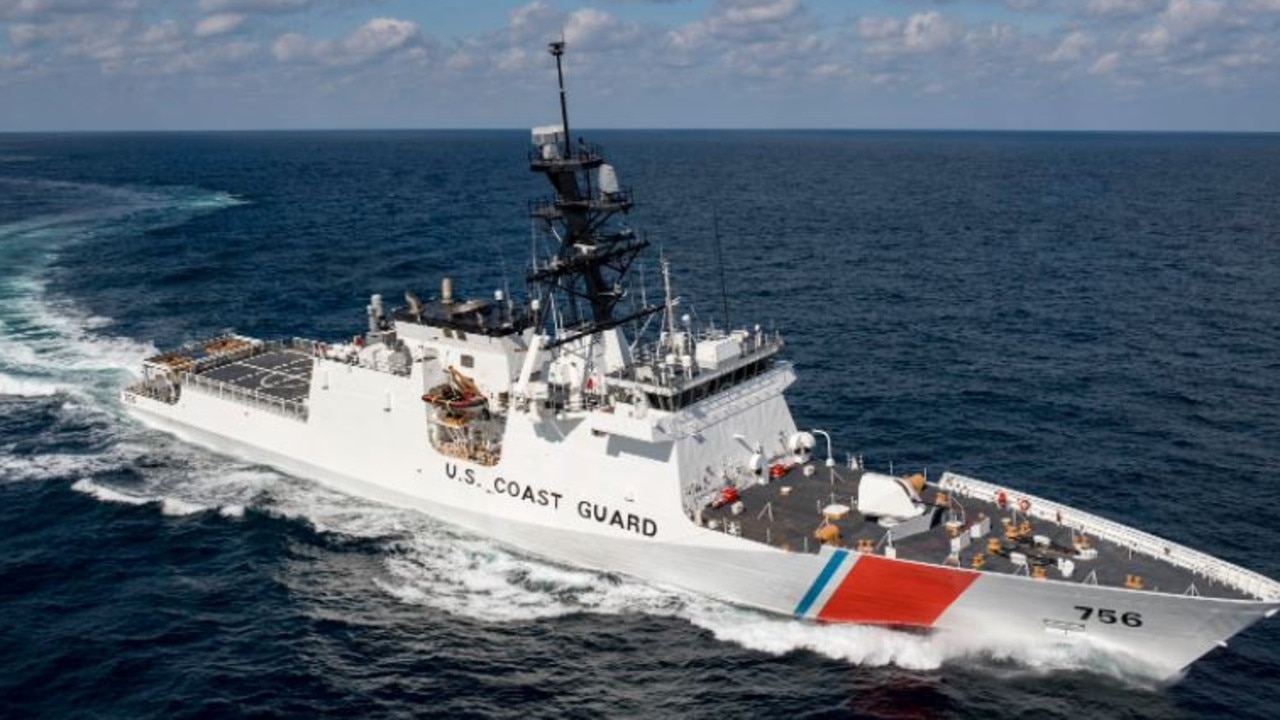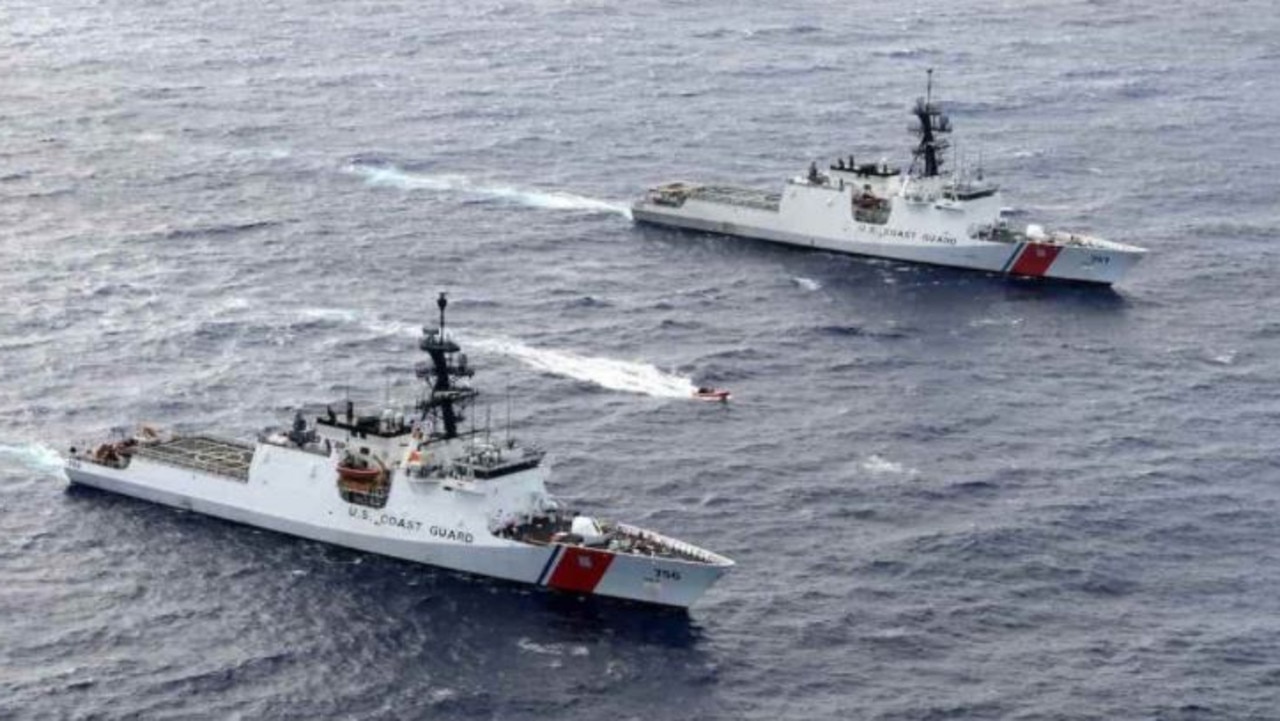US Coast Guard cutters sent to South China Sea to ‘free up shooters’
Ships have been sent out to the South China Sea to confront rampaging Chinese fishing fleets and “free up the shooters”.

It exists to police the US coast. Now it’s being sent to the South China Sea.
With new liaisons based in Canberra, Singapore and Guam, the US Coast Guard is on track to confront China’s rampaging fishing fleets.
His ships are “not ballistic missile shooters,” Coast Guard Commandant Admiral Karl Schultz told a recent address, “but you know not every place that you need a ship needs to have that capability.”
RELATED: Australia’s huge power play over China

What they have, however, is diplomatic presence.
A presence that is one small but significant step away from direct military confrontation.
And having Coast Guard cutters patrolling the Pacific will “free up shooters to be the key places they need to be,” Admiral Schultz said.
“We can do (the) sanctions work. We can do (illegal) fisheries. We can do other types of patrols.”
His ships are already on the job.
In December, the US Coast Guard vessel Myrtle Hazard boarded a group of Chinese fishing vessels operating illegally off the coast of the island nation of Palau. An illicit cargo of sea cucumbers was seized.
It’s a direct response to Beijing’s own expansion of Coast Guard presence and powers.
In April last year, a 3500 ton Chinese Coast Guard ship rammed and sank a Vietnamese fishing boat. (Beijing claimed the Vietnamese timber boat was responsible for the ramming).
In January this year, China’s Coast Guard was authorised to “use all means necessary” to stop “infringements of sovereignty”.
But the only nation that thinks it has exclusive sovereignty over the entire East and South China Seas is China. And Beijing has made it clear its ambitions extend much further into the Indo-Pacific.
RELATED: Australia move that China will hate
OPEN ‘LAWFARE’
In January, China’s Coast Guard was authorised to forcibly board foreign vessels “illegally” in Chinese-claimed waters.
“All means necessary including force” can be used to stop “infringements of sovereignty”. Weapons can be used when confronted with “dangerous methods”.
All this is allowed within waters “under Beijing’s jurisdiction”.
The problem is, Beijing supplied no definition of that “jurisdiction”.
Is it territorial waters under the United Nations’ Law of the Sea? Is it Beijing’s arbitrary “Nine Dash Line” claim over the South China Sea? What about its continental shelf claim, which embraces Japan’s Senkaku and Okinawa Islands, and Taiwan?
“In authorising its coastguard to use deadly force to uphold its maritime claims, Beijing has crossed a line,” writes China Maritime Studies Institute analyst Ryan Martinson.
Any foreign fishing, survey or research vessel operating within the South China Sea could be forcibly boarded and seized.
Vietnamese, Philippine and Malaysian settlements in the Spratly Islands could be violently dismantled.
Japanese fishing and coast guard vessels could be “expelled” from the Senkakus.
“Fortunately, just because Beijing has a law on the books doesn’t mean that it will actually enforce its provisions,” says Martinson.
He says applying these internal laws against foreign mariners would be “terrible foreign policy”.
“Beijing would further alienate its neighbours, pushing them closer to its rivals, the US and Japan,” he argues.
DAVID VERSUS GOLIATH
Beijing has been co-ordinating actions between its navy, coast guard and fishing fleets to assert its control over the South China Sea. Chinese militia squid boats have been implicated in North Korea’s “ghost fleet” – derelicts washed ashore on Japan’s coast, and sometimes containing bodies.
It has been pushing hard on the Japanese-controlled Senkaku Islands, some 50km west of Okinawa. They represent a choke-point for Chinese vessels headed into the Pacific. They also watch over rich fishing grounds.
Earlier this month, Tokyo matched Beijing’s moves. It authorised its coast guard to open fire on foreign vessels attempting to land on the 3.5sq/km of uninhabited rocks.
But China’s fishing militias are already pushing much further abroad.
Pacific nations fear Beijing will soon plunder their vital fighting grounds.
Its fleets have already been operating as far away as the Galapagos Islands and South America. And Beijing has approached nations including Vanuatu, the Solomon Islands and Papua New Guinea with lavish investment proposals for the construction of extensive new port facilities.
But it has a reputation problem to overcome.
Its boats are accused of violating territorial waters, fishing illegally in exclusive economic zones, and aggressive behaviour towards locals. Chinese tuna boats regularly swarm around Pacific Island nations such as Kiribati and Tuvalu.
Which is why an old World War II-era compact is being revived.
Pacific nations, including the Marshall Islands, Micronesia and Palau, have a longstanding agreement with the United States. They retain their national independence. But they get support from Washington – including territorial security.
Now they’re asking for help.
FOOD FOR THOUGHT
Washington has ordered three modern Coast Guard cutters to the island of Guam. Positioned in the middle of the Pacific Island, the island houses strategic military facilities, including ports and airfields.
It has added “police station” to its many roles.
#TravelTuesday Earlier this month the crew of the #USCG Cutter Frederick Hatch traveled from Lockport, Miss. to Key West, Fla. after accepting the cutter from Bollinger Shipyards LLC. Later this year the crew travels from Florida to the cutter's homeport of Guam. @USCGHawaiiPacpic.twitter.com/khb8CLHmCE
— U.S. Coast Guard (@USCG) March 2, 2021
The US Coast Guard is a civilian policing force. Not a branch of the US military.
As such, it falls under the auspices of the US Department of Homeland Security. Not the Pentagon.
And while its role is primarily policing US territorial waters, it has operated in concert with the US military in trade protection roles during times of war.
This is why any confrontation between US and Chinese Coast Guard vessels would be one step lower than a military standoff.
And that provides crucial diplomatic wiggle-room in the event of a crisis.
“They can do all this without as much of a risk of complication that the navy would pose doing the same job,” US Congressman and House Armed Services Committee member Seth Moulton told the Wall Street Journal.

In November, the US Coast Guard assigned an attache to the US Embassy in Canberra. The role will facilitate co-ordinated policing efforts with New Zealand, Papua New Guinea and other South Pacific Island states.
Another is due to take up a similar role in Singapore next year.
“I see these strategically placed Coast Guardsmen making a big impact with our global maritime partners” Commandant Schultz said.
“This is part of our effort to increase our footprint in the Indo-Pacific, doubling-down on operations and engagements with like-minded island nations and Quadrilateral Security Dialogue partners.”
ENFORCERS
In 2019, a US Coast Guard cutter traversed the Taiwan Strait.
Its presence was a reminder of the place international law had in regional disputes.
But it wasn’t a military threat.
It’s a message Washington is hoping to reinforce.
The US Coast Guard’s handful of new cutters are fitted with a naval cannon and can carry helicopters. They’re built to be fast and long-ranged.
But, in the Pacific, they’re significantly outclassed. The Chinese Coast Guard is now the largest in the world. Its ships are the largest. They are heavily armed. They’re not just designed to protect coastal waters. They’re intended to operate far, far from home.
This is in keeping with the Chinese Ministry of Defence’s policy of “near-seas defence with far-seas protection”.
Nor is it an entirely civilian operation.
Recently, the Chinese Communist Party moved the Coast Guard out of civilian control and into the domain of the Central Military Commission. It’s now led by naval officers operating under the military chain of command.
Other coast guards, such as those of Australia and the United States, are only placed under direct military command in time of war.
Such a lack of civilian-military distinction poses a new political “grey zone” for any confrontation — especially given Beijing’s new “open fire” orders.
“Aside from being vigilant and shrewd, what else might regional states do?” asks Martinson. “At the very least, they should tell Beijing that they will never accept the law’s application against their citizens in disputed waters and warn of severe consequences if China does so anyway.”
Jamie Seidel is a freelance writer | @JamieSeidel




